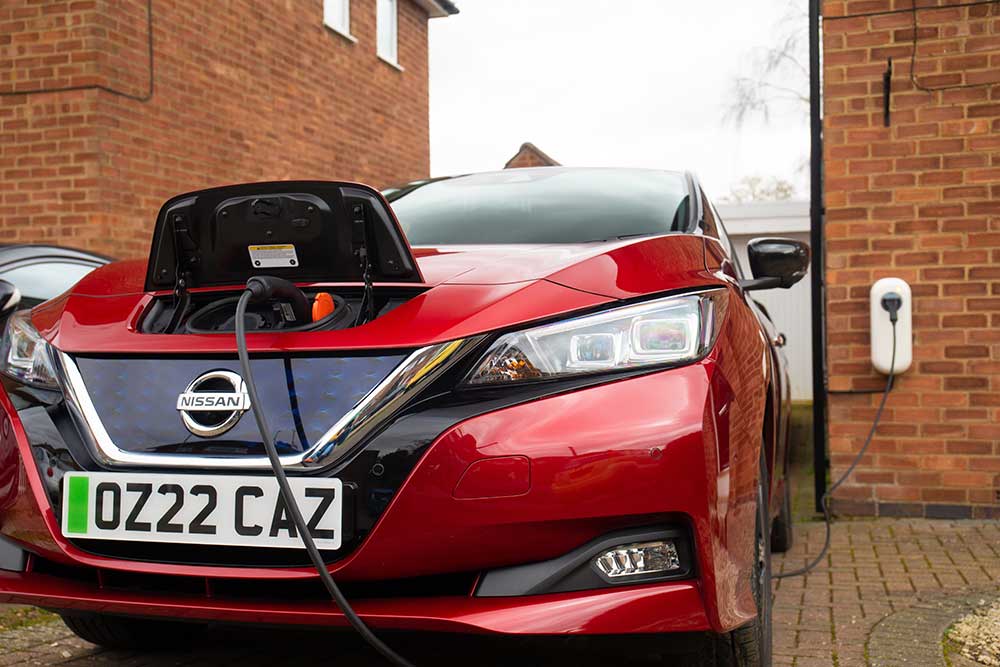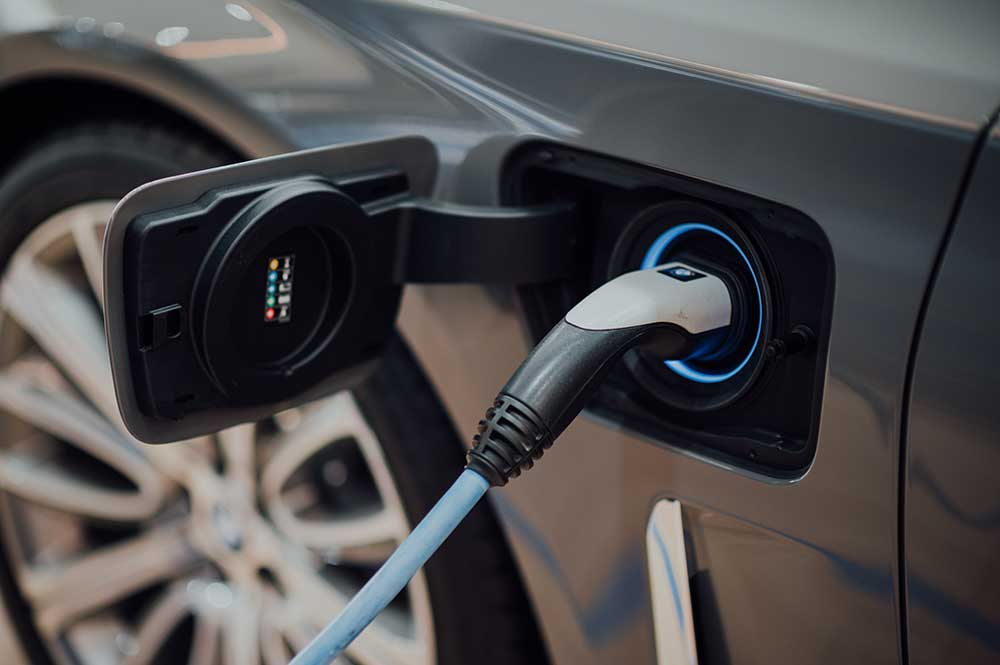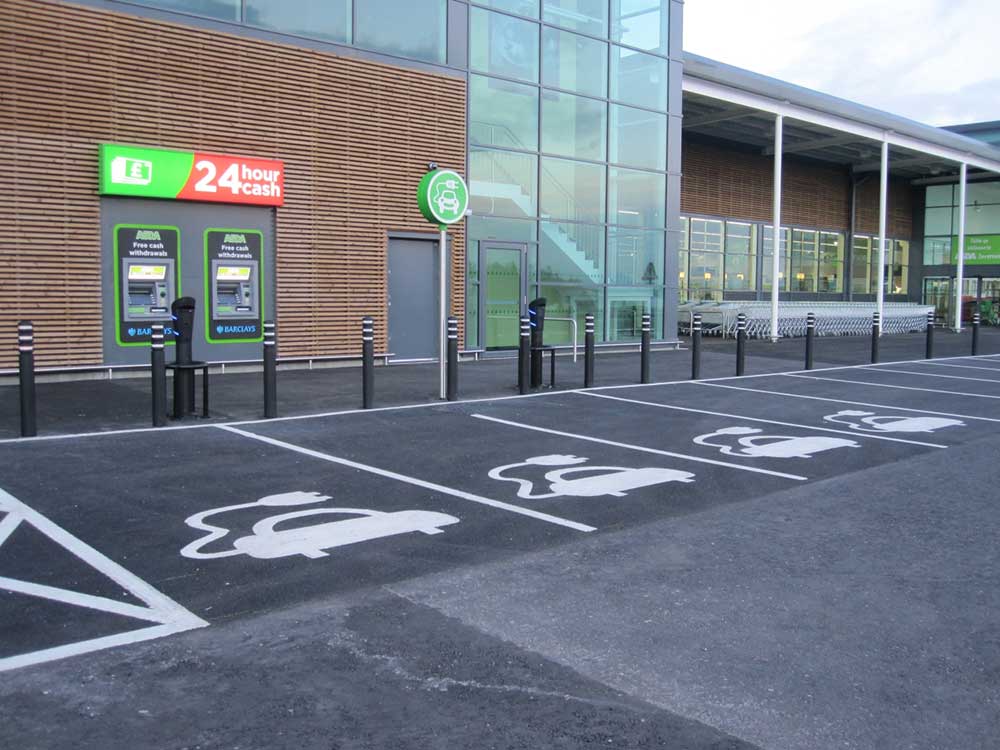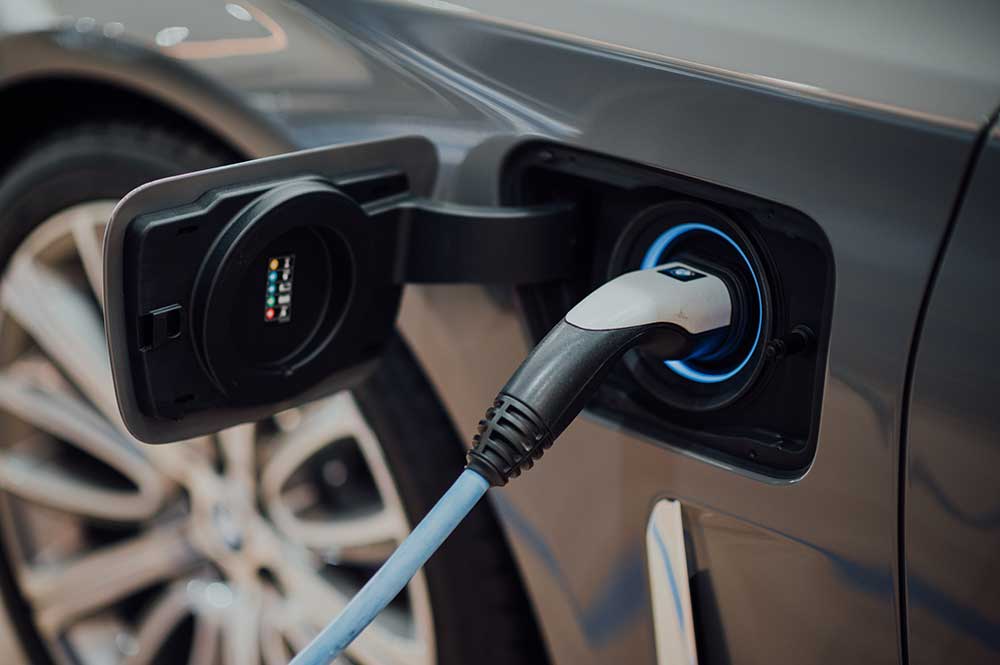When considering switching to an electric car, there’s one important question asked by most drivers – how do you charge it?
It may sound like an obvious question but the answer is both simple and complicated at the same time.
The reality is that once you’ve switched from a petrol or diesel car to an EZOO EV, you’ll no longer need to stop at a petrol station – at least not to fill up with fuel.
Electric charging options these days are in great supply, making journeys ever more simple and hassle-free.
In this guide, our EZOO team break down everything you need to know about charging an electric car – including how to charge up, where you can find chargers, the costs involved, how long your car will take to charge, and more…
How to charge an electric car

While it may seem complex to keep an electric car charged up, it is very similar to any other device powered by a rechargeable battery. Just like how you charge your mobile phone, you simply connect your car to an electric charging point via a cable.
Where can I charge an electric car?
You can charge an electric car at:
- Home (providing you have a wall box charger installed and a driveway)
- Work (if your employer offers electric charging points in the car park)
- A public charging point (often found at motorway service stations, supermarkets, hotels and car parks).
Home, work and public charge points all operate the same way – with a charging cable that connects directly to the car via the charge point to top up the battery.
We’ll cover these charging locations in more detail in the sections that follow.
Electric car charging at home
Charging an electric car at home is one of the most convenient ways to charge your vehicle, as you don’t have to travel to a specific location to do so. Doing so also means you can charge your vehicle while you sleep, so your vehicle is fully charged the next day.
There are two ways you can charge your electric car at home:
- Via a standard three-pin plug
- Via a home wall box charger
Charging an electric car at home with a three-pin plug
While you can charge an electric car from a three-pin plug socket, we wouldn’t recommend that you do so.
The first reason is that a domestic plug socket is not designed for high consumption. The maximum rate of charging you can get here is around 2.3kW – that’s less than half of what you’d typically get from a home wall box.
A three-pin socket will also charge your car very slowly, which means these are best reserved for emergencies only. As an example, the Lexus UX 300e has a 45kWh battery capacity, which would take almost a day to fully charge via a three-pin socket.
We recommend that you stick with a dedicated home wall box charger. It will be much faster and safer to use – especially if you have off-road parking.
Charging an electric car at home with a wall box charger
Often called a home charger, a wall box charger is a specific EV charging unit that you can have installed on your driveway or in your garage. Because it is specifically designed to charge electric vehicles, charging is much quicker and more efficient than using a three-point plug.

Which home charger should I choose?
A modern home wall box charger, by comparison, typically charges at 7kW.
While there are some older 3kW units still available on the market, we’d recommend you avoid these and always buy the fastest unit available for your budget.
Most home chargers come with a built-in charging cable, although there are a few models where you connect using the cable that comes with your car.
While these units are slightly more expensive to buy, they remove the hassle of having to dig around in the boot to find the right cable when you want to charge.
Yes – there’s a small risk that the built-in cable attached to your wall box might one day become obsolete. But as the industry standard Type 2 connector is widely used across most new models, it’s unlikely to be replaced anytime soon.
Can I get a faster home charger?
Most UK homes have what’s called a ‘single phase’ electrical system. It’s a typical domestic energy supply, which can support a wall box charger capable of speeds up to 7kW.
This speed will charge most electric cars overnight – all depending on the size of the battery. For example, a 50kWh battery in a Renault ZOE can be fully charged in around 7 hours, while the larger 77kWh battery in a Volkswagen ID.4 takes around 9 hours to fully top up.
Faster 22kWh wall box chargers are also available and are compatible with a small number of the latest electric models.
However, this type of charger can only be installed when a building has a ‘three phase’ electricity supply – a system that’s not commonly used in residential buildings.
Electric car charging away from home.
Workplace EV Charging
While having a charger at home is still the most convenient way of charging your electric car, a number of employers are helping drive the switch to EVs by installing chargers at workplaces – making it even easier for business drivers on one of our EZOO Pay As You Go deals.
The government also offers business drivers further incentives to encourage EV adoption such as the zero fuel benefit on charging. This means that if your company pays the cost of charging your company car, or provides you with a workplace charger, it’s tax-free even if you charge for personal use – meaning there won’t be an impact on your finances.
Public electric car charging
When you’re away from home or work, you’ll be reliant on public chargers. The good news is that the UK’s charger network has seen huge growth in the past couple of years – because of this, living with an electric car is easier than ever before.

There are now an estimated 800,000 electric cars on UK roads – and the public charging network is continually expanding to meet this increased demand.
According to the EV charging website Zap Map, as of June 2023, there are now almost 44,408 public charging points in the UK, across over 25,521 locations. In total, these locations offer over 70,800 public connectors.
However, the UK’s charging network is not evenly spread across the country. London and the South East host far more public charging points than areas like Scotland and Wales – so this is something you may want to research if you’re planning a longer road trip in your EZOO car.
Lastly, if you are restricted to using public chargers or plan to use them frequently, it’s worth noting the ones located in your local area and making sure you sign up with various providers. This is because some networks won’t let you charge if you’re not subscribed to their service.
On the plus side, many providers offer discounts for subscribers, so it’s worth doing some Googling before you get out on the road.
Types of public electric car charging points
There are different types of public EV charging points, each capable of charging your car at varying speeds. Choose from:
- Rapid & Ultra-Rapid charging points – rated 50kW, these chargers are typically found at service stations and can charge a car to 80% in just 40 minutes.
- Fast charging points – between 7kW and 22kW, fast chargers can charge an EV in between eight hours (on a 7kW charger) and three hours (22kW charger).
- Tesla Superchargers – designed to charge Tesla vehicles, these 150kW chargers can charge a Tesla to 80% in just 30 minutes!
How much does it cost to charge an electric car?
Prices for charging an EV vary depending on where you decide to charge your vehicle. In this section, we break down the costs of charging your EV at home and away:
How much does it cost to charge an electric car at home?
For most of us, our cars are parked up overnight, making a home charger the cheapest solution. To help keep the cost of charging down, most electricity suppliers offer off-peak nighttime usage rates for electric car owners, typically costing around two-thirds less than a peak daytime rate.
While the cost of charging an electric car at home will vary, a full charge costs between £10 to £20 depending on the size of your battery. This makes home charging the cheapest option for drivers.
There are other renewable energy options, too, such as solar panels and home storage batteries. However, these are very expensive to buy, costing anywhere from £5,000 to £10,000 or more – meaning they may not be as cost-effective as a standard home wall box charger, which should cost less than £1,500 to install.
How much does it cost to charge an electric car at a charging station?
When using a public charge point, the costs can vary dramatically. For example, using a 7kW public charge point should be fairly affordable, costing you only slightly more than it would to charge at home.
When travelling and on the road, though, a public DC rapid charger is the quickest and most convenient way to top up your battery.
Just as the cost of petrol and diesel varies, the costs of these charge points vary, too – from as little as 40p per kWh, rising to around 77p a kWh.
For models like the Porshe Taycan, which features a 79kWh battery, a rapid charge from 10-80% would require 55kWh of energy – costing you around £22 when using a cheaper charging network, or around £42 at the most expensive.
As we said earlier, the cost of charging depends on the providers, so you must do your research on which networks offer the best value for money, as well as sign up to get the best deal.
If you need any help or would like to find out more, please send us an email and we’ll do our best to assist you.
How to pay for electric car charging
You know how to pay for a tank of fuel, but how to pay for electric car charging?
If you charge your EV at home, the cost of charging will simply be added to your household electricity bill.
Many charging providers now offer apps that drivers can use to start charging their car, monitor how much they’ve spent on the changing session and pay for the charge using their phones. This is super convenient, although if you will be using multiple charging providers you will likely need to download multiple apps.
Some charging points offer contactless payment functions on the chargers themselves, although this tends to be on newer chargers, specifically rapid and ultra-rapid points.
Some other chargers require drivers to have an RFID card to pay for this charging. This type of payment is usually found on older charging points and is becoming less common as chargers are upgraded.
How long does it take to charge an electric car?
The easiest way to calculate how long it will take to charge your EZOO car is to divide the battery size (kWh) by the speed (kW) of the charger you’re using.
Using the 77kWh version of the Skoda Enyaq iV as an example, a full charge would take around 10 hours using a 7kW home charger, or around 60-90 minutes when using a 150kW DC rapid charger.
Of course, charging speeds can vary due to the weather. Colder temperatures impact battery performance, so charging may be slower.
Similarly, the condition of your battery can also affect charging speeds – although this should have a minimal effect on most newer EVs with modern batteries.
Types of electric car charging cables
Whichever method you use to charge your EZOO car, most EVs are equipped with one of four connector types.
The oldest type is the Type 1 connector, which is found in early electric models. Drivers with this connector type can still use a majority of public chargers with a modern Type 2 connection, however.
Type 2 tends to be standard on most newer EV models available from EZOO on our Pay As You Go deals.
As before, a Type 2 connector is compatible with home and public charging points. However, a large number of models fitted with a Type 2 connector also feature what’s referred to as a ‘CSS Connector’ or Combined Charging System. This is integrated into the main Type 2 connector (it’s accessed via a small cover) and it allows you to take advantage of the ever-growing network of DC rapid charging points in the UK and Europe.
When connected to a CCS-compatible rapid charger, a 10-80% top-up can take around 30 minutes – which is enough time to stop for a coffee break while charging before hitting the road with plenty of range.
Lastly, some electric cars are compatible with a slightly different connector called CHAdeMO, which operates in the same way as a Type 2 connector. It also allows you to connect to DC rapid chargers and is typically used on Japanese models such as the Lexus UX 300e – a model that features both CHAdeMO and Type 2 charging ports.
To find out more about any of the above, please visit our FAQ section, or contact us by sending an email to [email protected].
Although there are many different options to consider when it comes to electric car charging, topping up your car’s charge is easy once you get started. Now you know more, why not start looking for your perfect electric car?
Alternatively, take a look at our guide to electric cars for even more information about EVs.

